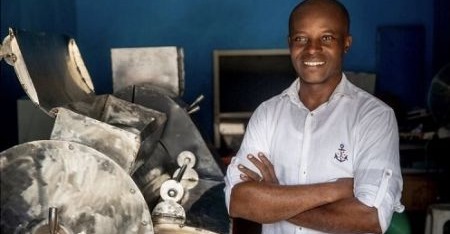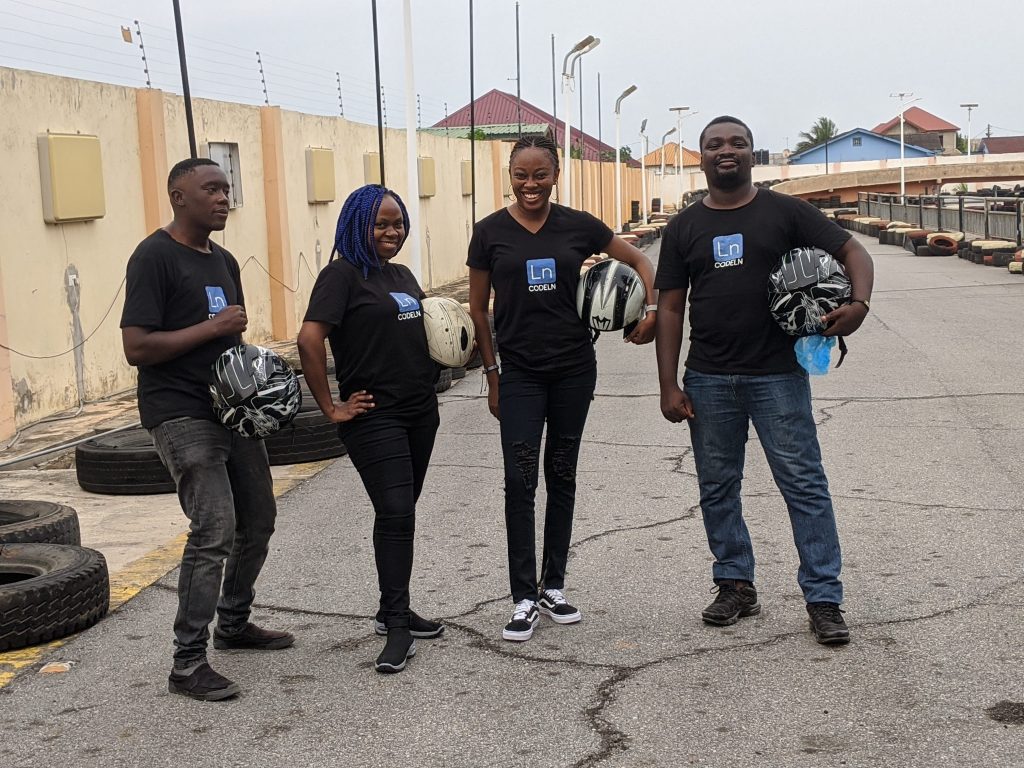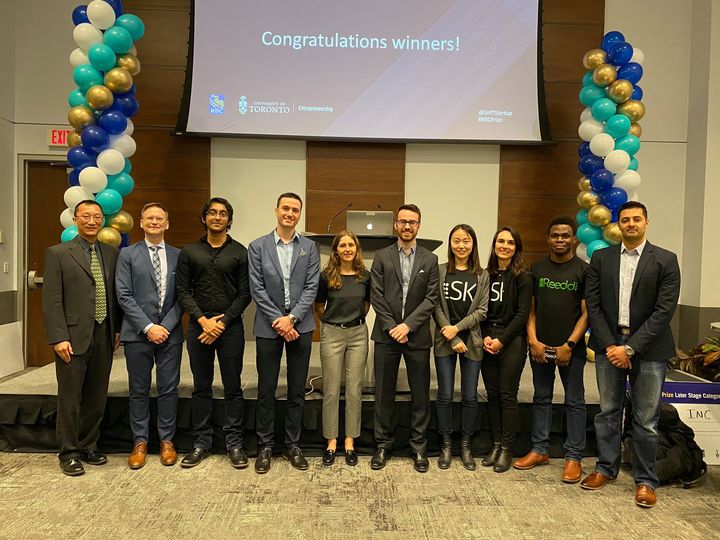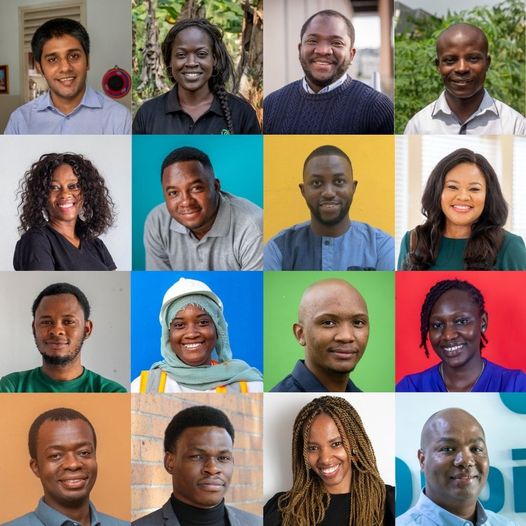Six Nigerians have been nominated for the Royal Academy of Engineering’s Africa Prize for Engineering Innovation 2021. The Nigerians, comprising 4 male and 2 female innovators, join 10 other Africans vying for the prestigious Prize this year.
Launched by the Royal Academy of Engineering in 2014, the Africa Prize recognises ambitious African innovators developing scalable engineering solutions to local challenges.
A total of nine countries were represented in this year’s shortlist. Ivory Coast, Gambia, Senegal and Ethiopia are represented on the nominee list for the first time since inception. Of the 16 nominees, 6 are female inventors. Without further ado, let’s meet the Nigerian nominees.
Jacob Azundah (Aevhas)


Credit: Facebook/Aevhas
Garri is a staple West African food that passes through a very long and tedious production process. Therefore, any innovation that aids its production just has to be very important. This is what Jacob Azundah was able to achieve with his high-efficiency garri processing machine, Aevhas.
So, with the peeling, washing, grading, pressing and draining done, Aevhas completes the process of sieving and most importantly, frying the garri. Whereas traditional methods of frying take up to 4 hours to produce a basin of garri, Aevhas does it in just 20 minutes.
Many will be encouraged to return to farming because of the simplicity in processing garri, and as a result we can greatly reduce levels of poverty and hunger. We hope that an increase in the number of cassava farmers will bring about food security in Nigeria.”
Jacob
Jacob Azundah holds a Bachelors Degree in Mechanical Engineering from Near East University in Nicosia, Cyprus. He hopes that his invention which is suitable for both community-based businesses and industrial use will bring about food security in Nigeria.
Elohor Thomas (CodeLn)


Image: Twitter/CodeLN
The challenges of hiring the right staff with the right qualification and capacity needed to fill technical vacancies will always be a challenge. But Elohor Thomas is standing up against that challenge. CodeLn is an automated tech recruitment platform that helps companies looking to hire people in the software engineering field.
Through the web-based, artificial intelligence platform, a recruiter can post a job specification and immediately get matched with suitable candidates via CodeLn’s recommendation system. The recruiter could also test the coding skills of the candidate and present them with an offer letter – all through one platform.
CodeLn is connecting African programmers to local and global job opportunities. With over 100 million new tech jobs projected globally by 2025, we are preparing African youths and software engineers for new and exciting opportunities.”
Elohor
Elohor Thomas is a software developer and holds a Masters Degree in Systems Engineering (Artificial Intelligence) from the University of Lagos. She’s a MEST Africa and Y Combinator alumnus. She hopes to provide young African programmers with the resources to grow in their careers.
Olugbenga Olufemi Olubanjo (Reeddi)


Anybody who has lived in Nigeria knows the biggest problem is power. This is even more so for people living in rural communities. The problem of power is one that successive governments have failed to address. But control systems engineer, Olugbenga Olufemi Olubanjo is doing just that with his energy system, Reeddi.
After suffering countless blackouts like everyone else, Olugbenga Olubanjo finally decided he has had enough and developed the ’always ready’ Reeddi capsule system. This portable system provides power to communities and businesses without electricity, at an affordable price. His targets, however, are the low-income rural areas of Subsaharan Africa.
“Reeddi’s novel solution relieves users of the mobility, cost, payment and flexibility constraints of other energy-generating options.
Olugbenga
Olugbenga is a control systems engineer. He bagged a Bachelor’s in Civil Engineering from the University of Ibadan before obtaining a Master of Applied Sciences in Civil Engineering from the University of Ontario. Reeddi was one of the Winners of the 2020 RBC Prize for Innovation and Entrepreneurship at the University of Toronto.
Taofeek Olalekan (RealDrip)


Image: LinkdIn
While Maternal mortality rate in Nigeria is declining along with global figures, a lot still needs to be done. 1 in 22, compared to 1 in 4,900 obtainable in developed climes, is still very poor. Same could be said of the infant mortality rate of 181 per 1,000 live births in 2020 despite a 2.44% decline from 2019.
Taofeek Olalekan’s RealDrip, if widely adopted, could crash these figures very significantly. A medical device that simplifies intravenous therapy for drip and blood transfusions for pregnant women, this N76,000 ($200) device would crash the cost of infusion pumps from between $5,000-$15,000 (N1.9m-N5.7m) and provide access to precise and smart infusion at a 96% price reduction.
We have positioned the product to potentially save the lives of 76,000 pregnant women and 500,000 babies every year.
Taofeek
Taofeek Olalekan is an IoT and Machine Learning engineer. He holds a Bachelor’s Degree in Physics Electronics from the Federal University of Technology, Akure. RealDrip has been approved for production and has been preordered by 27 hospitals.
Yusuf Bilesanmi (ShiVent)
With the world battling the deadly Covid-19 global pandemic, one device that has proved very effective in treating patients is a ventilator. Sadly African countries find themselves in acutely short supply and this is the challenge which Yusuf Bilesanmi’s Shifatech is tackling with Shivent,
Shivent is a non-electric and non-invasive ventilator for patients with respiratory difficulties which can be operated by basically anybody. The device is low-cost and only requires 150 to 200 cylinders of oxygen a day (for emphasis, regular ventilators use up to 400 cylinders of oxygen a day).
In designing our solution, we noted the requirements and guidance of the NHS and MHRA (Medicines and Health Regulations Authority) in the UK on the standards required for a medically-compliant ventilator.
Yusuf Bilesanmi
Yusuf is an Energy and Infrastructure business developer. He bagged a first degree in Law from the University of Lagos before switching to engineering with an MSC in Smart Grid Systems from Waseda University in Japan. He hopes his solution would serve under-resourced clinics with unreliable electricity supply and limited access to specialist knowledge.
Faith Adesemowo (Social Lender)


There’s a continuous debate about financial inclusion and whether the available solutions are indeed serving the underserved or rather just extensions of the pre-existing services. Faith Adesemowo’s solution, Social Lender is looking to actually bring financial possibilities to people without prior access.
Social Lender partners with service providers like banks, microfinance institutions, micro-insurance companies and agricultural input companies to offer facilities to over 50% of Africans who lack access to formal financial services. This population includes farmers, traders, artisans, young professionals, small business owners, students etc.
We aim to reach one million users in Nigeria in the next 12 months and help them gain access to financial services using the Social Reputation Score. They will also receive services such as financial literacy training, agricultural extension best practices trainings, and biometric registration for onboarding to Social Lender.
Faith
Faith Adesemowo is a finance specialist who holds a Bachelor’s Degree in Agriculture from the University of Ilorin. She proceeded to the University of Warwick where she bagged a Post Graduate Degree in Business Administration.
The Africa Prize for Engineering Innovation
The Africa Prize for Engineering Innovation was established in 2014 and aims to recognise outstanding African innovators in the field of engineering. Criteria for selecting nominees include having an innovative engineering product or service that solves a real problem facing a community in sub-Saharan Africa.


Applicants must also present solutions that have the potential to scale beyond their current target market, viable and scalable business proposals and founding teams with entrepreneurial potential. Their solutions must also have the capacity to bring social and or environmental benefits to a country/countries in sub-Saharan Africa.
According to the Programme Manager, Africa Prize for Engineering Innovation, Cordelia Burch, benefits attached to winning the prize include an eight-month programme featuring intensive and tailored entrepreneurship training from business experts across Africa and communications support and photography.
Winners will also get engineering mentorship to help them further develop their innovations, networking and access to the Academy’s network of high-profile experienced engineers and business experts, funding.
Cordelia Burch, Programme Manager, Africa Prize for Engineering Innovation
After finishing the programme the entrepreneurs join the Africa Prize alumni community – a community of (currently) over 80 engineering innovators and startups from across 12 countries in Africa.
The winner of the 2021 Africa Prize for Engineering Innovation would be announced at a final event in July. At the event, four finalists, who will have been pre-selected from the shortlist of 16 by a Judging panel, will pitch their innovations. The winner will receive £25,000 and the other three finalists receive £10,000 each.






